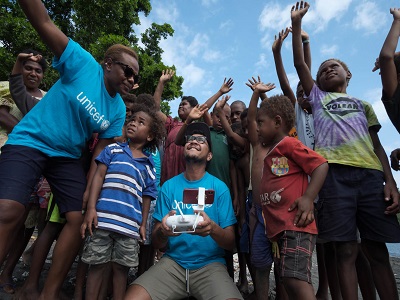By exploring the intersection of the rapidly changing worlds of business, technology and social good, this course is designed to help you to prototype innovative solutions that address the most pressing challenges in the lives of vulnerable children.
UNICEF Innovation Fund provides investment and support to frontier technology solutions that address the biggest challenges facing children today.
Based upon the experience of the Innovation Fund, this course has been designed to support UNICEF Country Offices and other development practitioners designing and testing solutions in the intersection of emerging technology industries and the challenges facing the most vulnerable children.
At the end of the course you will get a certificate of completion.
Learning objectives
At the end of this course, you will be able to:
- Reframe your approach to your programmatic challenge to account for intersections with other rapidly changing global challenges and trends
- Discover new, “unusual suspect” partners to co-create solutions for your challenge
- Explore how new and existing data sets can provide new insights to programmatic challenges in your work (e.g., how imagery can be used as an indicator of poverty, or how disasters can be mapped by looking at phone call frequencies)
- Research who (in business, academic, non-profit space) is working on frontier solutions in data and technology related to your challenge to discover potential partnerships
- Formulate meaningful challenges that enable your organisation to engage in the conversation around emerging technologies with relevant networks (startup community, academia, business)
- Have conceptualised an early stage initiative that addresses a challenge from your work that you can use in leveraging resources to take your initiative off the ground.
Audience
-
UNICEF staff (country offices, Regional Offices and HQ)
-
UNICEF partners
-
UNICEF and National Committee consultants, interns, volunteers, goodwill ambassadors and National Committee board members
-
Development practitioners across the board: UN; International NGOs, governments, local NGOs
Length
It should take you about 2 hours to complete this self-paced course.
Methodology
In order to complete this course, you’ll need to complete each of the three sessions.
In Session 1, we’ll explore how increasingly complex global trends push us to adopt new approaches to solving some of our most pressing challenges. We will do this by taking a deep dive into two complex issues: migration and youth in the 21st century. We’ll also analyze how these types of global issues have profound implications for our collective future, and why these kinds of systemic problems force us to explore new approaches and data, reframe our challenges, and reach new understandings when identifying solutions.
In Session 2, we’ll explore how rapid advances in data and technology offer us exciting opportunities in understanding and addressing the complex global issues we covered in Session 1. This session is designed to help you to explore the world of big data by taking a closer look at UNICEF’s MagicBox platform, and will lead you through the most exciting developments in emerging technologies with a focus on Vanuatu’s drone trials.
In Session 3, you will have a chance to work through your own challenge or idea by showing how you can build in checkpoints that enable you to gather feedback from your users. The session will also outline some of the key elements we have seen that lead to scalable solutions. These elements, based in UNICEF’s Innovation Principles and human-centered design, also form the criteria that UNICEF’s Innovation Fund uses to assess new solutions for funding.
To get most out of this course, we’d like to invite you to take a challenge or an innovative idea from your work with you for the duration of the course. It may be a bottleneck you have identified where traditional solutions aren’t leading to the desired result, or perhaps you already have an idea or a hunch about a new approach that could help in leapfrogging the challenge. At different points during our sessions, we’ll ask you to work through the challenge you’ve chosen, and to develop your concept conscientiously as we go along. At the end of each session, you’ll be able to download your responses to these reflections. Our goal is that by the end of this course, you will have a draft project plan or pitch that you can use in leveraging resources to take your initiative off the ground.
Throughout the course, you’ll hear from colleagues within UNICEF and from outside organisations (via recorded interviews) on our most pressing challenges, the opportunities we can leverage in confronting them, and the principles of scalable design.
Structure
This course is composed of 3 modules:
Session 1: Our Challenges
- Introduction And Course Navigation
- Introduction To Our Challenges
- Deep Dive: Migration
- Deep Dive: Youth In The 21st Century
Session 2: Our Opportunities
- Introduction To Big Opportunities
- Introduction To Big Data
- Deep Dive: Big Data
- Introduction To Emerging Technologies
- Deep Dive: Vanuatu’s Drone Trials
Session 3: Designing Scalable Solutions
- A Framework For Effective Innovative Design
- Unicef’s Innovation Principles
- Design With The User
- Design For Scale And Sustainability
- Be Open Source And Collaborative
- Course Conclusion
Contact details
Technical issues: agora@unicef.org
